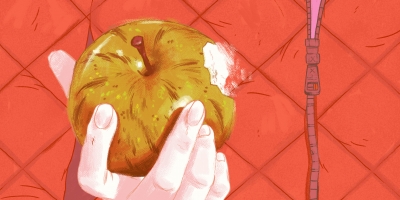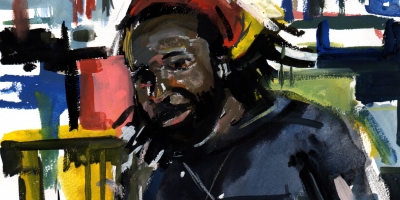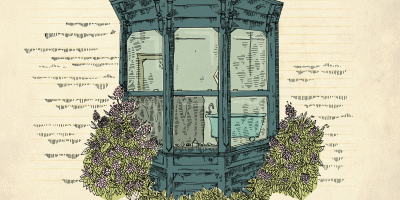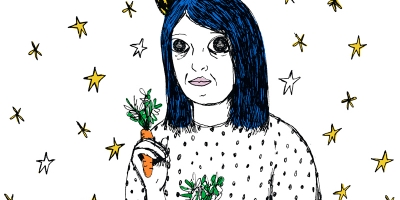In Conversation with
Marlon James
by Kima Jones

Too often in love, we love blindly, overlooking or choosing not to see or not to know. Halfway through Marlon James’s triumphant new novel, A Brief History of Seven Killings, I found myself surprised by all I did not know about Bob Marley—a man blanketly loved in my childhood home alongside MLK, Malcolm X, and Jesus Christ. The only secular music allowed to play in our house on Sundays was Beres Hammond’s and Bob Marley’s because those were ital tunes, good for the soul. No bad word was ever said against Bob Marley. Perhaps an uncle would slyly mention Marley’s many women—in the way one would make mention of King Solomon’s wives—a remark made in admiration with just a glint of jealousy that was really more like awe. I have loved Bob Marley in the way one loves a shooting star: with respect, veneration, and reverence, but with no real or true understanding of how it came to be or why its light, blasting through the night sky, was extinguished so abruptly.
Marlon James has written a towering, near 700-page novel on the 1976 attempted assassination of Bob Marley. For all I now know, there are still so many questions. A Brief History of Seven Killings is more than a Bob Marley story. It’s a story of a country, of many countries, the slums, and the elusive war that defined a decade: the War on Drugs. The only answer within these pages is that history begets history and the children of history refuse to see, would rather not know.
Marlon and I talked one morning about his novel and the enduring legacy of the legend Bob Marley.
Kima Jones: In this new novel, you empower the dead with the knowledge and sometimes the responsibility that you give to the living. Talk about that decision.
Marlon James: I think, in a very big way, that’s something that’s been a part of Jamaican and African storytelling from the get-go—the idea of ancestors and mentors and spirits lurking around and still being actively involved in the life of living people. I think it’s something that’s endemic to the tradition of oral storytelling. It’s everything from African fiction, to Jamaican folklore, to Gabriel García Márquez in One Hundred Years of Solitude, where the living and the dead exist pretty easily.
The idea that ancestors are always present and that their duties don’t stop with death is something that’s been a part of literary and oral and musical culture from the beginning. In this novel, the twist I made is that no one can hear the ghost and no one is listening anyway, so it’s the source of his torment. Even if there is wisdom of the elders, no one is listening, and it’s the reason why we keep making the same mistakes over and over again. The character in the book, Arthur Jennings, dies a violent death, and he keeps seeing people around him dying of violent deaths—the seven killings, and more and more. A dead person almost becomes a sort of Cassandra. Even if they have this wisdom or experience, or they know the mistakes they fell prey to and they have this information to bestow, it doesn’t mean that we’re taking it. We’re rejecting it because we just don’t believe in it anymore.
If anything, this novel is about the severing of the link between the ghosts and the spirits and the living. In the absence of that link, everything sort of falls apart.
Jones: What’s the worst duppy story you’ve ever heard? Is A Brief History of Seven Killings the most horrific ghost story that you have to tell?
James: I’m not really scared by horror stories at all. The scariest thing I ever saw was Psycho. Hitchcock scares me a lot more than horror. Something like Texas Chainsaw Massacre is fear of the gore more than anything. Psycho was the last time I was ever really scared of a film. Hitchcock kills off his main character halfway through the film, and you’re left hanging and you’re thinking, What now? It’s the uncertainty, in the sense that anything can happen, that terrifies you.
I’m more scared by the film No Country for Old Men because all bets are off. It’s one of those rare films, especially if you’ve read the book, where you really don’t know who is going to die, and just because someone has star power doesn’t guarantee that they’ll survive the film. That’s what scares me: the uncertainty and the randomness of how death can happen.
A lot of critics think A Brief History of Seven Killings is horrifying, but I don’t think so, and I don’t think the characters think they’re living in horror. The fact is that even the most terrible situation is normal for the person living in it. In a lot of ways, this is the funniest book that I’ve ever written. It has the most humor and the most ridiculousness—certainly, it’s the most experimental. I don’t know about horror, but there’s violence and brutality. It opens up with a dead guy, but then again, death and horror is a Western association. It’s certainly not that way in the East. It’s certainly not in non-Anglo storytelling. This character’s horror comes from something quite living, not from anything spiritual—it comes from the fact that he was murdered. The horror that exists in the book isn’t supernatural: it’s the basic cruelty that human beings commit against each other. That is the scary stuff. Anything might happen at any time, and that’s what’s unnerving. It’s real, upfront, everyday fear.
Jones: Papa Lo is one of the most interesting characters in the cast. I’d like to juxtapose him against the lyrics of Bob Marley’s “Duppy Conqueror,” specifically the lines:
Yes I’ve been accused, many times
And wrongly abused now
But through the powers of the Most-I
They’ve got to turn me loose
Don’t try to cut me off on this bridge now
I’ve got to reach Mt. Zion
So if you a bullbucka, let me tell you this
I’m a duppy conqueror, conqueror
James: Papa Lo is somebody that’s been around long enough to realize the way in which he was living as a gangster and a don is not leading anyone anywhere. At some point, you realize that the killings only benefit someone who doesn’t even live in the community. When Papa Lo kills the schoolboy, he realizes he was killing his own sense of hope. He was killing the person with the potential to leave, to graduate, to sort of escape this ghetto. Even his right-hand man, Weeper, is someone who could have made it out. [Papa Lo] realizes he’s one of the reasons why people can’t leave the ghetto; he realizes he’s one of the trappers, and it becomes a crisis for him. He realizes who really wins wars. Soldiers don’t win wars. Soldiers get PTSD, and then the government ends up not taking care of them. He realizes he’s a foot soldier in a bigger war—whether it’s the Cold War, or the war of local politics, or the war of people who don’t have his skin color and status. Then it becomes an epiphany.
Too, Marley had this epiphany and it’s where we get the line, “Don’t make a politician do you a favor, or he’ll try to control your life forever.” It’s a ghetto wake-up call that Papa Lo went through and Marley went through, and it became very dangerous for the status quo, which is why almost everyone involved in the Peace Concert is now dead—most of them violently. It’s a very dangerous situation of poor, disadvantaged people waking up to their poverty and disenchantment and realizing it’s not necessarily their fault. That’s why many of the characters in the book say, “Bad times are good times for somebody.”
Jones: Weeper is definitely one of my favorite characters, even though he is base and does terrible things. I’m actually more interested in the facts that he is a scholar and is openly closeted, if that’s a thing. He’s such a round, complex character. What was it like writing him?
James: Weeper’s complexity actually comes from true stories. Some of the things that people think are invented are actually true. It’s also this thing that Chimamanda Ngozi Adichie talks about with “The Danger of a Single Story,” where we think one person is the sum total of one thing.
Weeper was a lot of fun to write because I got to layer him with contradictions and conflicting ideas. In a lot of ways he’s a scholar, but his violence came about in the way a lot of people in the ghetto’s violence comes about—because of police brutality. The police smash his glasses, and despite being able to afford better ones, he wears those glasses for the rest of his life. Weeper is also the way some of the other characters get complicated. For example, it’s easy to dismiss Josey as just some violent thug killing everybody and taking over the ghetto, but it’s his idea that Weeper moves to New York. It’s his idea that Weeper moves to New York to be comfortable, to be gay. He fully knows that Weeper is gay, and wishes he wasn’t, but also suggests moving to a city where the people can tolerate his friend better. Weeper is, in a lot of ways, the embodiment of failed potential—actually, stolen potential. His future was taken from him. I am not justifying him or any of these characters, because he is a mean, psychotic son-of-a-bitch, but one of the things I wanted to do with this book is bring some complexity to evil and to bad characters.
Sometimes range means going from bad to really, really bad. The biggest influence on me was The Godfather Part II. I just love how it shows how Don Corleone slowly develops the taste for blood, because he doesn’t start out that way. You don’t end up sympathizing with him, and you certainly don’t end up liking him, but you do understand him. And that’s what I wanted—I wanted you to understand Weeper. I don’t want you to like him or feel sorry for him, because he couldn’t care less. He would kill you and move on with his day, because he doesn’t care. There are so many things about Weeper, even the things like him trying to “straight sex” his way into becoming straight. He is a villain, but I didn’t want people to have an easy perception or a quick way to sum up his character and then move on. Weeper is a character that resists summary. I cannot find one sentence to describe him; he eludes that.
Jones: I’m really interested in this idea of complicating villains, considering that your last novel, Book of Night Women, is a slave narrative. What is worse, more evil, and heinous than a slave master—especially, a slave master who claims to love his slave?
James: The overseer has a totally different perception of their society than the slave does. For one, he pulls his “we were slaves, too” card. And it is true, Irish people were slaves—even in the Americas, they were slaves—but it’s an especially glib thing to say. And people still say that, by the way, and it’s not true. There’s no comparison. That’s like saying Roman slavery was the same thing as British slavery, and I’m like, No! You cannot flatten and compare those experiences. Robert Quinn, the overseer, thinks that, and he thinks it’s a common ground between him and Lilith, never realizing that he isn’t in any bondage. He really doesn’t get it, and he thinks that there is this potential for love between them. The idea of having this kind of privilege, to have such a warped and naïve view of love and relationships and differences, is something that Lilith, despite having feelings for him, realizes: that this is a bridge that she can never cross. It just can’t happen. This scenario where she is the head woman he sleeps with until he gets tired or she gets sold—this is a scenario where she realizes that there is no future.
What’s part of the dynamic is rape and abuse and murder. Robert Quinn’s “not getting it” is dangerous because he is choosing to ignore that he is falling in love with somebody with no agency. If he gets tired of her, he can sell her, move her, get rid of her, kill her, whatever. To Robert Quinn, it’s “I’m falling for you even if society thinks I shouldn’t,” but to Lilith it’s an undue attachment to property.
A lot of people read Book of Night Women with a lot of wishful thinking saying, “Surely love must have happened in the history of slavery. Surely, love conquered all.” And I’m like, No. No. No.
Jones: Full disclosure: I was not a fan of Book of Night Women at all. I read an interview where you said you wanted the reader to be uncomfortable enough to make the decision not to like your books. Contemporary slave narratives are really hard to pull off, and, I find, it’s because this issue of love without agency is central to the plot. I’m thinking of Dolen Perkins-Valdez’s Wench and Valerie Martin’s Property. If we consider The Chaneysville Incident and Beloved and Kindred to be the holy grails of the slave narrative, how do contemporary writers approach that much history with care?
James: It’s a dangerous sentiment to want to let your ancestors off the hook.
Jones: In A Brief History of Seven Killings, you are making powerful indictments against the Jamaican police, police brutality, and especially public displays of police brutality. Can you talk a little bit more about the decision to hold the police accountable in that way?
James: In 1976, Jamaica was a police state. Jamaica was under a curfew. People were detained. If you arrest people, you have to charge them, but if you detain them, you can keep them forever. There are people who spent over a year in detainment. There were children who were detained to get them off of the streets. It was one of the most glaring violations of human rights in Jamaica, and it was supported by quite a few things, including the Suppression of Crimes Act. Police cannot be corrupt in a vacuum. There must be a system to back them up.
Talking about Ferguson, Missouri, I tell people, “Well, of course the policeman is going to get off.” I’m not being pessimistic, but I know the US Supreme Court. There are provisions in place in the American courts so that American cops will always get off. It’s part of the law. In that sense, it’s not much different than Jamaica when it was a police state in the ’70s, or Latin America. In Jamaica’s case, people versus the police is something that stemmed from the nineteenth century. The 1865 suppression of the Morant Bay Rebellion—which was not a rebellion; “rebellion” is a colonial spin, and I hate that term—Morant Bay was people standing up for their rights, and it was brutally suppressed by the police. In 1938, protests for improving standards for living were also brutally suppressed by Jamaican police. It’s nothing new and certainly not endemic only to Jamaica. By the 1970s, not only was there abuse but also an astonishing amount of incompetence, and those two things tend to go together. Every Jamaican can tell you a bad police story; if it’s not brutality, it’s corruption or it’s bribery.
Jones: You have this cast of characters, over thirty in total, that range from the shottas to the lovers and journalists. I love how you’ve managed to balance these first-person narratives without introducing the white characters—who are namely journalists and CIA operatives—as authoritative voices to verify or legitimize the black characters.
James: I have very little patience for those stories and those movies. The traditional “white guy goes through a three-dimensional experience served by one-dimensional black people.” Funny enough, the people who are doing it a lot now are white women. I’ve spoken about this, and I’ve never been shy to talk about it. I had a Facebook post where I said, “White women, please don’t become the new Orientalist, because we didn’t like it when white men did it.” This sort of “I had my three-dimensional, life-changing experience surrounded by all of these Negroes or all these Asians or all these people from the South Pacific.” Enough. I wasn’t interested in that at all. If anyone wants that story, there are five being made right now. We do not have a lack of stories titled How I Found My Third Dimension While I Was Around the Natives.
The thing about these white characters—the Americans, the tourists—they have agendas. The Rolling Stone reporter wants glory and fame. He wants to be the white guy who gets it. If you live in Jamaica, you run across them all of the time. There are these tourists, “the white guys who get it,” and they don’t get it. That just means they’ve been to a ghetto once. To his credit, my character is conscious of it. He knows that knowing the “real Jamaica” just means that he’s seen some poverty.
I didn’t want the existence of my white characters to be validation or justification or proof of the existence of these other, many Jamaicas within Jamaica. They don’t know what the hell is going on in Jamaica, but they’re there. The reason why they are in the novel is because 1976 Jamaica was bigger than just Jamaica. If it wasn’t, they wouldn’t be there. 1976 is a violent story, it’s a Bob Marley story, it’s an election story, and it’s also a Cold War story and a drug war story, which is why they are there and involved. That’s the context in which they exist.
Jones: You do a remarkable job of writing how the introduction of cocaine and crack cocaine to the island really shaped Jamaican gangs during this time. What was that research like?
James: My generation, if you were sixteen in 1986, was the generation that fell for crack. Quite a few of my friends were on it, and some of them still are. The introduction of that drug culture is something that I knew personally.
That said, Jamaicans played a major part in drug trafficking in the late ’70s and early ’80s, creating the cocaine railroad from Colombia to the Bahamas to Miami and all the way to New York. At the same time, a lot of Jamaicans were moving to New York. Jamaican gangs were very good at using their networks. Having been trained on twenty and thirty years of political violence, Jamaican gangs just had a remorselessness and a brutality that really impressed drug lords in Miami and New York and Cali. They were brutally efficient: they had no problem killing 300 people in order to shoot two. Cocaine was an opportune time for everybody, and crack was just so cheap. It would not be the same history if it had stayed just cocaine. Between the price of crack, and the huge market, and the fact that Jamaicans were particularly efficient as runners and as the muscle, it became a conspiracy that worked in a lot of people’s favor. The decline of the Bronx and certain parts of Brooklyn in the 1980s certainly helped. In the grand scheme of things, the Jamaicans weren’t the biggest players, but they weren’t the only people. In a lot of ways, A Brief History of Seven Killings is a quintessential ’80s story.
Jones: I was born after Bob Marley died, and he was still very much a deified presence in my upbringing. You have said in other interviews that you refer to Bob Marley as The Singer in this book because his name already invokes so much mythology. Every time I read the phrase “The Singer,” I felt such a loss and sadness. It was almost ghostly. Did you want the reader to feel like they were losing him before they even got him? Because that’s how I felt.
James: Losing, but also that he was already gone and already out of our reach. He was already an icon and a symbol and not really a person. In some ways, his early death was both surprising and inevitable. The reason I went with The Singer instead of his name was because I wanted him to be mythical. By then, Marley was already known more for what he represented than for who he was. People don’t know the day-to-day breakdown of his life, and they don’t have to. Some people don’t know that Marley subsidized hundreds of families in Jamaica. They only know him as a symbol, and a lot of powerful people did not like that symbol. His attempted assassination was also, ultimately, surprising but inevitable.
Jones: As I was reading this book, I thought, Wow, this is a really great book that has nothing to do with the “Great American Novel” trope. Without sounding reductive, how freeing is it to write without that idea over your head? The phrase in and of itself is a slight to world literature. The phrase says that the literary chosen one is coming out of America.
James: There are few things that depress me more than hearing the word “great” followed by a nationality and then the word “novel.” There is no such thing as the great anything novel. Up to a few years ago, nobody said anything about the “Great Irish Novel” until more Irish people started living in America. The “Great” thing is so destructive. Why are we striving for one book to be the defining document? The only way to pull off the Great American Novel is if there’s only one America or American. The only way to write the Great Jamaican Novel is if there is only one Jamaica, and I grew up in fifty different Jamaicas. It speaks to a particular kind of literary malaise, literary self-esteem problem. It’s a weird type of literary penis-swinging. Writers are simply not that universal. There can never be one great anything. The only thing you can do is laugh at it, because it’s really an attempt to qualify and rate and judge books and other people’s stories.
The other side of that is when people have panels about the future of literature, which I also find absolutely ludicrous. So you, from your very narrow perspective, are going to sit here and try to predict the future of the next fifty years of writing? How pompous and how moronic. It’s reductive, and thank god literature resists that. There used to be a time when world literature was a relief from that and you wouldn’t find that type of idea floating around in international literary circles, but you see it now. At least twice already, someone has called this book the Great Jamaican Novel. For something that’s absolutely impossible, people still believe in this sort of literary beauty contest. It’s a very infantile appreciation of art.





